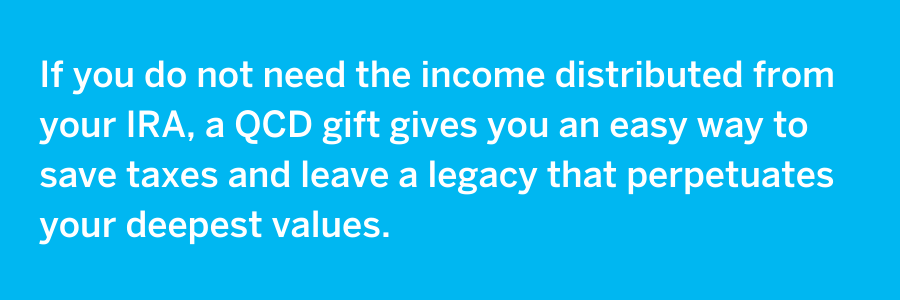
If you are like many people, a significant amount of your assets may be in your IRA or other retirement fund.
Two types of gifts from your retirement assets can save taxes and leave a gift to a cause you hold dear: a charitable gift from your IRA (a Qualified Charitable Distribution, or QCD) and a bequest of your retirement assets.
New Law May Impact Your Retirement Savings: Three Things to Know
Under the SECURE Act recently passed by Congress:
- The IRA Required Minimum Distribution (RMD) age has been raised by 1 ½ years to 72, extending the time to defer taxable withdrawals.
- Tax-free charitable gifts (QCDs) from your IRA can still be made at age 70 ½.
- There is no age limit on contributions to your IRA, allowing you to grow your retirement assets as long as you are earning income.

How do I save taxes with an IRA QCD gift?
During any year, the amount of your IRA assets that you transfer to charity can satisfy your RMD, reducing or eliminating the income taxes due on your RMD. You can annually transfer up to $100,000 of your IRA, regardless of the amount of your RMD.
How do I make my QCD gift?
For each year in which you wish to make a QCD gift, you must notify your IRA custodian for instructions on how to transfer your distribution amount to your charitable organization.
What if I have a 401(k) or other retirement account?
The IRA QCD gift only applies to IRAs. However, if you have retirement assets in a 401(k) or other retirement fund, it is often possible to roll over funds from your other accounts into an IRA and then make a QCD gift.
Bequest of Unspent Retirement Assets: Save your family taxes and leave a legacy
While your retirement fund is likely to be the foundation of your retirement, have you considered what happens to your unspent savings? Taxes may significantly diminish the retirement funds given to your family. Thoughtful planning can help you determine the best way to allocate your retirement and other assets to save your family taxes and leave an enduring gift to a charity meaningful to you.
The problem with leaving retirement assets to family.
Retirement assets left to your family are subject to income taxes and, if you have a taxable estate, estate taxes as well. These taxes can substantially reduce the amount that you intend to give to your family.
Leaving stock and real estate to your loved ones may be a better choice.
Stock and real estate will be received with a stepped-up basis and can be sold with little or no tax due.
Can I still receive distributions from my retirement assets?
Yes—you can continue to take distributions during your lifetime. Your gift is made in your will.
Can my surviving spouse receive lifetime distributions?
You can provide your spouse with income from your retirement assets by placing the assets in a charitable remainder unitrust in your will.
How do I leave my retirement assets to my charity?
Regardless of what your will says, your retirement fund beneficiary is determined by your fund’s beneficiary designation form. Simply ask your account custodian for a new form to direct your retirement assets to your charity. You may change your beneficiary at any time.
To learn more, please contact Randal Daugherty at (214) 648-3069 or randal.daugherty@utsouthwestern.edu.
Read more of our 2020 Planning Matters Spring series:
Dr. and Mrs. William W. Turner Jr.
A Message from our President and CEO
Request Your Complimentary Planning with Retirement Assets Booklet